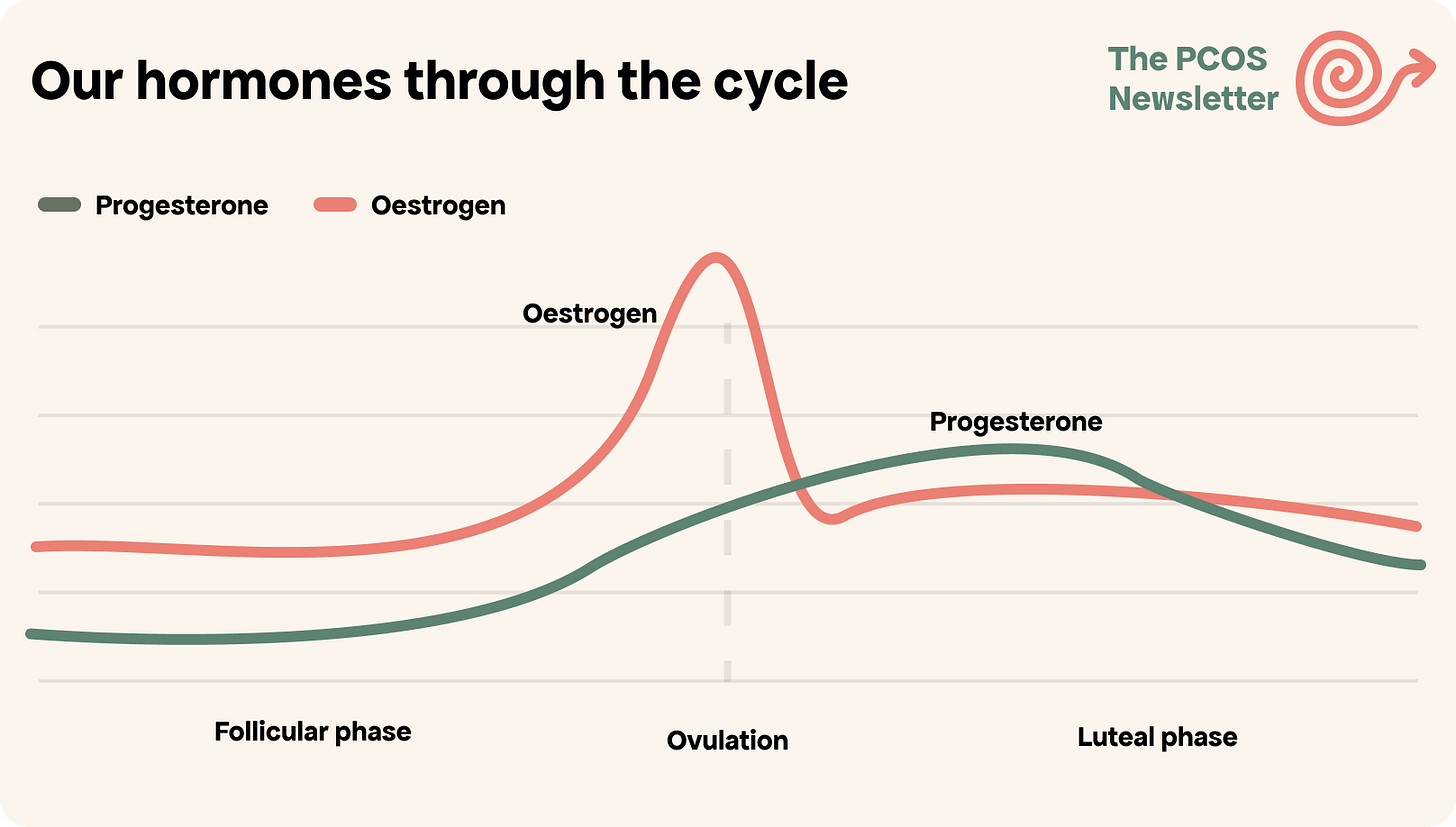PMS: Weight gain, Cramping and Headaches [Part 2] #60
Hello, my favourite PCOS people
How are you doing? I have been in Berlin for a week now with work. It's such an interesting city. I am very impressed with how many healthy eating options there are. I am finding it more accessible than other cities to eat balanced.
In last week’s newsletter, we discussed cravings, mood swings, bloating and GI issues.
Today, we continue discussing PMS symptoms with:
Weight gain
Cramping
Headaches
A small reminder of what our hormones do through our cycle:
Weight gain
You might notice your clothes getting slightly tighter in the second part of your cycle. Sometimes, we start looking puffier and might feel insecure about our bodies. You might also notice the scale going up. Of course, this happens because of our shifting hormones (thank you hormones).
A slight increase in oestrogen occurs in the days leading up to your period, which causes your body to retain more water. The added water retention swells the cells in your body, sometimes resulting in some minor weight gain before your period, along with the feeling of being bloated and slightly puffy. It’s not weight, it’s water.
Also, progesterone has its fair share of blame. Progesterone competes for the same receptor in the body as another fluid-regulatory hormone, aldosterone (responsible for retaining sodium). This sets another wave of reactions that reduces blood volume - up to 8%. This makes our blood a bit thicker and more challenging to pump.
This is also why pushing at the gym in this part of the cycle is more challenging. All of this will make you feel more bloated and puffier. Drinking plenty of water and avoiding foods high in salt and sugar will help. However, it’s also natural, so we must embrace it and stop blaming our bodies for doing what they were designed to 🙂.
Cramping
Cramping just before your period and during your period is somehow natural. Considering that we shed a whole tissue, it’s crazy to me. We build the uterine lining, and it goes away as our period. The release of prostaglandins drives this process, and it’s what causes the pain. Our uterus is contracting to release our uterine lining.
Some of us have minor cramping, whilst some can’t move out of bed. If you are in the latter category, please know to speak to a doctor. We are not meant to suffer once a month.
Sometimes painful periods can be caused by a condition such as:
womb tissue growing in other places (endometriosis and adenomyosis)
growths in and around the womb (fibroids)
an infection of the womb, fallopian tubes and ovaries (pelvic inflammatory disease)
If it’s any of the above, getting help is critical.
For milder pain, Magnesium and Omega-3 supplements may help relieve some of the pain.
Headaches
I have spoken to women who get headaches regularly around their period. It's a bizarre symptom, but it has a reason. Headaches tend to happen when progesterone and estrogen drop right before your period. They are usually brought by changes in blood pressure and the sudden dilation and constrictions of your blood vessels. It comes down to how your brain receives the proper blood supply and oxygen.
A way to manage it is to stay extra hydrated and consume foods high in nitric oxide. Nitric oxide helps our vessels dilate, increasing blood flow. These are beetroot, pomegranate and spinach.
Conclusion
For those with irregular periods, you might experience these symptoms ad hoc. It’s good to know why they are happening as a clue of shifting hormones. It is pretty crazy the variations in hormones we experience throughout 30 days. Women are complex, and what we feel and experience is forever changing. Let’s keep learning about it so we can work with this amazing body we have.
See you next Sunday,
Francesca
If you want to chat about your PCOS, work with me or fancy connecting with someone who understands, book a chat with me here for free.
1 Sources
Aikaterini, G. (2017). PMS (Premenstrual Syndrome). International Journal of Complementary and Alternative Medicine, 6. https://doi.org/10.15406/IJCAM.2017.06.00175
Bonetti, G., Kiani, A. K., Medori, M. C., Caruso, P., Manganotti, P., Fioretti, F., Nodari, S., Connelly, S. T., & Bertelli, M. (2022). Dietary supplements for improving nitric-oxide synthesis. Journal of Preventive Medicine and Hygiene, 63(2 Suppl 3), E239. https://doi.org/10.15167/2421-4248/JPMH2022.63.2S3.2766
Sims, S. T., & Yeager, S. (2024). ROAR, revised edition: Match your food and fitness to your unique female physiology for optimum performance, great health, and a strong body for life. Rodale Books.
Disclaimer: We are all unique in our ways, so this information is for educational purposes only. In my communications, I summarise research data and bring my experience. This shouldn’t be viewed as medical advice at any point. Please further consult your healthcare provider about your health needs.


